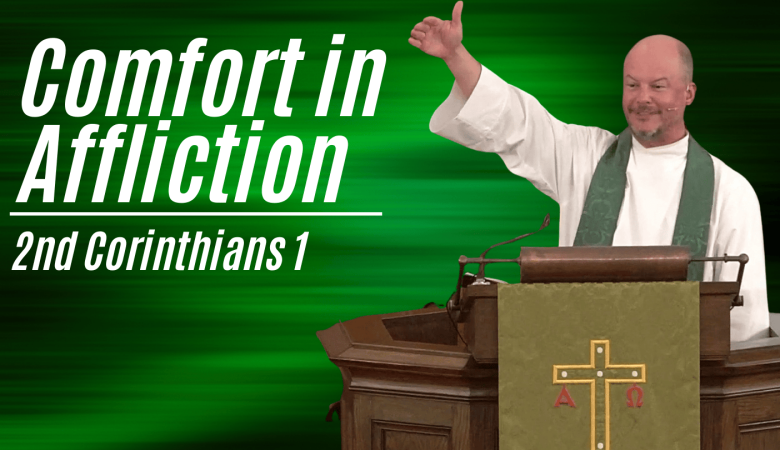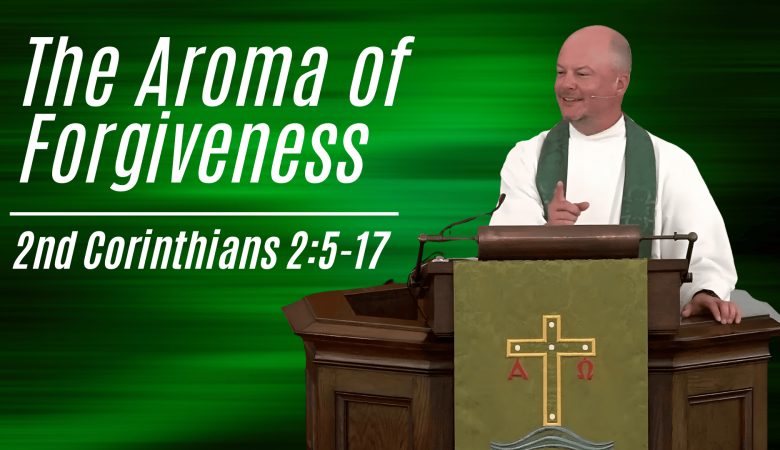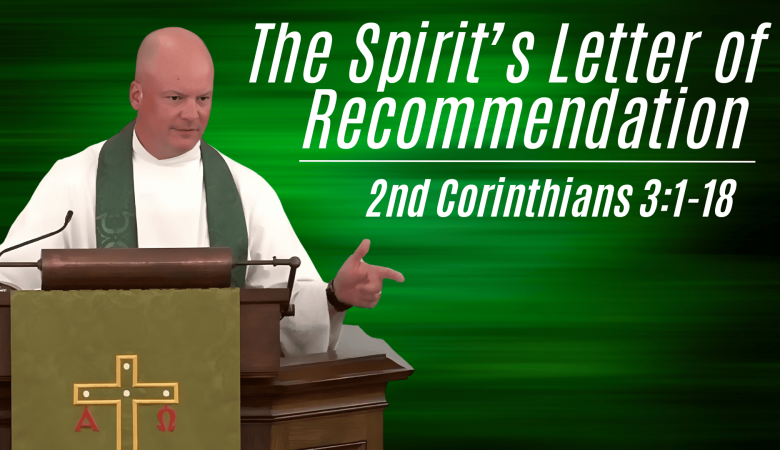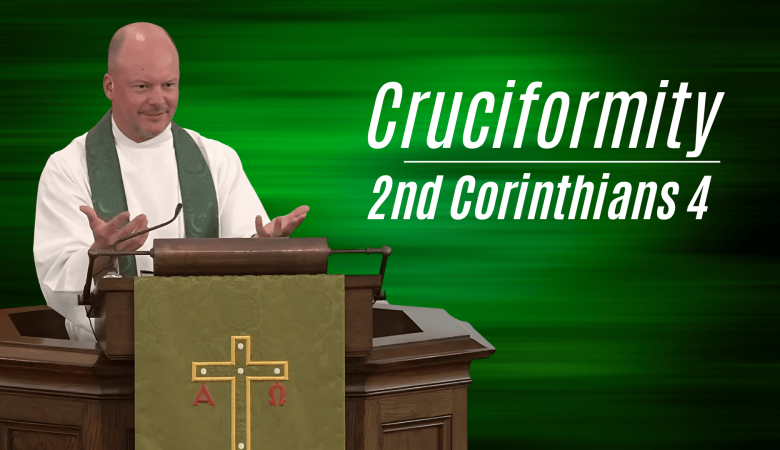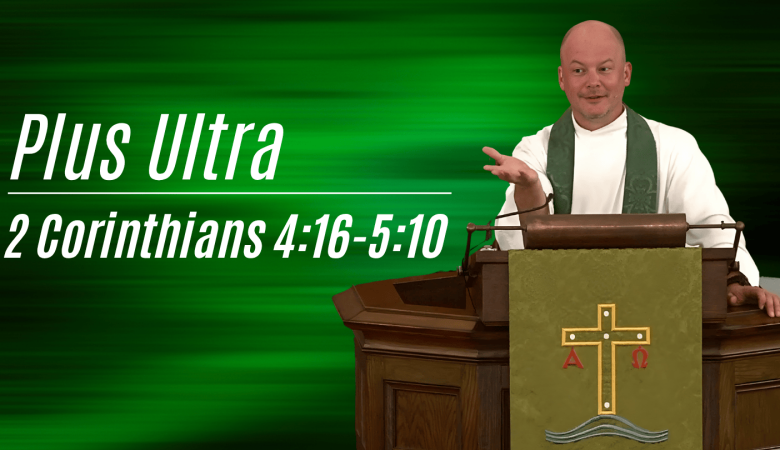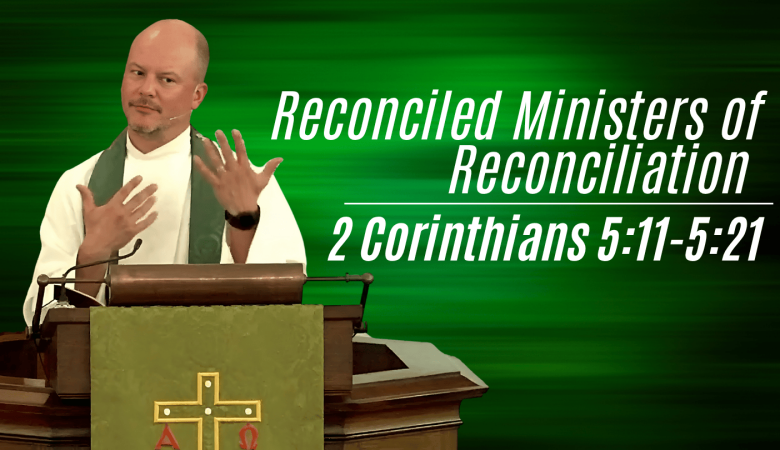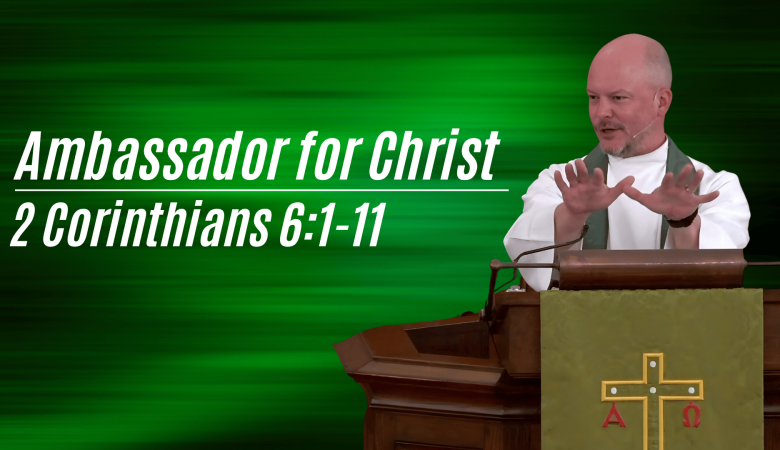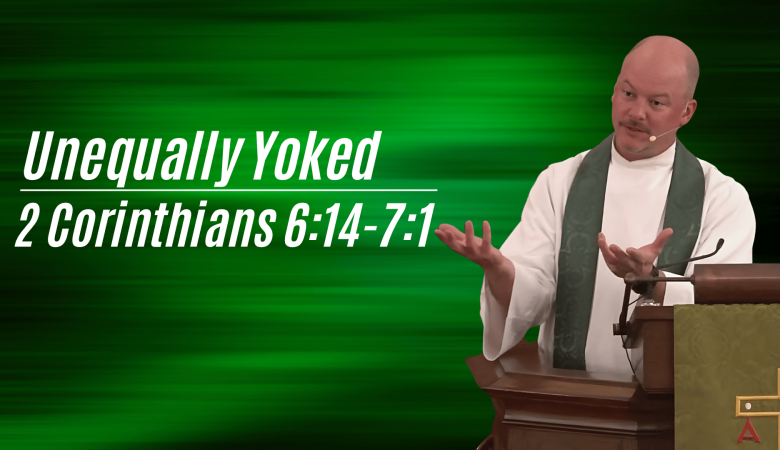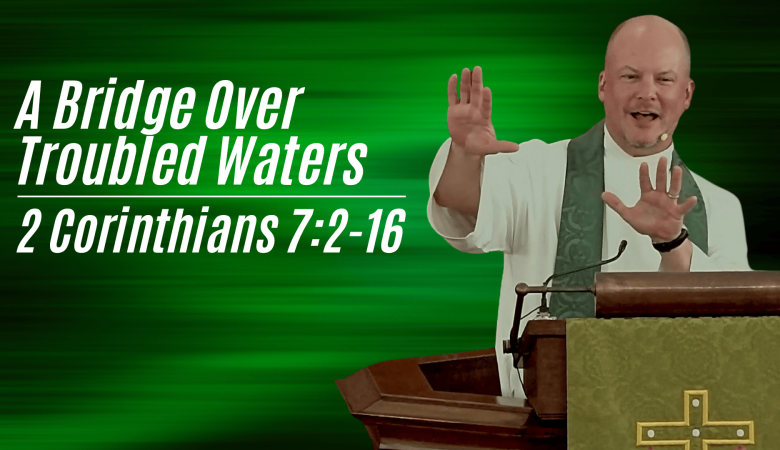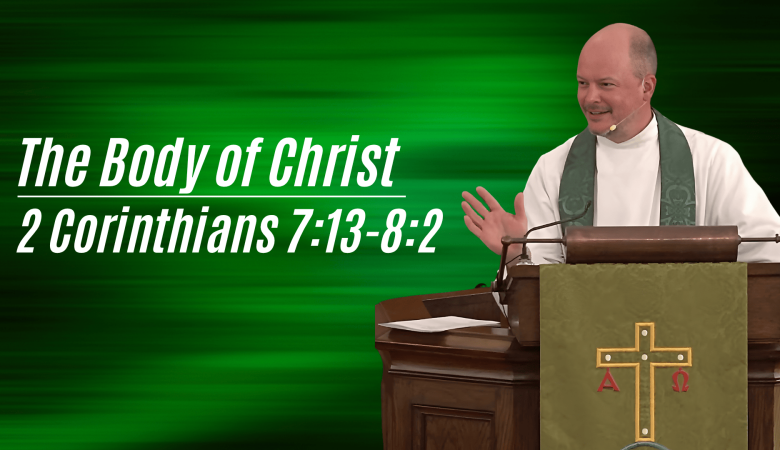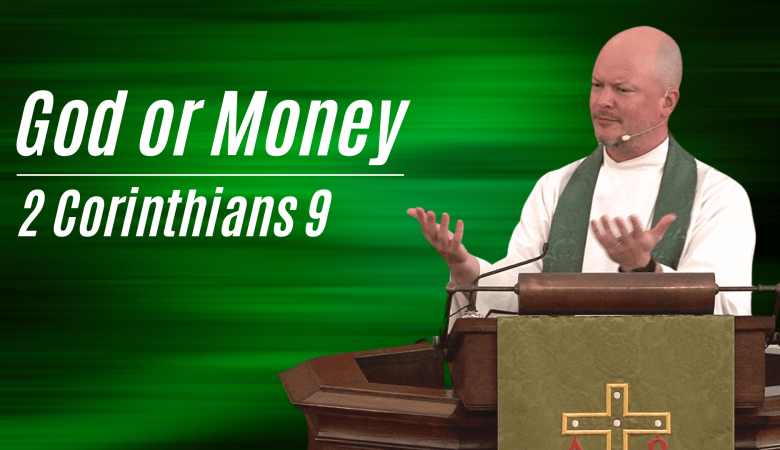Series: Power in Weakness
Riches I Heed Not Too Much
October 26, 2025 | Jed Stalker
Passage: 2 Corinthians 8:1
Summary
Second Corinthians 8 addresses money directly, encouraging the Corinthian church to contribute generously to support poor believers in Jerusalem. Three principles emerge from Paul's argument that help navigate the complex relationship between faith and finances.
Jesus remains central to every decision: Paul grounds his appeal in Christ's sacrifice: though rich, Jesus became poor so humanity might gain spiritual riches through his poverty.
Money serves as a temporal good, not an eternal one: Paul quotes Exodus 16, referencing the manna God provided to starving Israelites in the wilderness. When some hoarded extra manna overnight, it bred worms and rotted. Paul draws a profound parallel: money won't endure into eternity any more than manna lasted past morning.
People matter more than money: Paul implements careful accountability systems for the Jerusalem collection, sending three messengers from different churches to ensure transparency and prevent fraud.
Transcript
Oh, Lord God, we confess that you are God and we are not. In your light, we see light. Please grant us your grace, illumine this text for us. Help us to know you and love you better. We pray these things in the name of Jesus Christ our Lord. Amen.
This is a famous quote here. Try to remember if you have heard this before, and if so, where, and then come and talk to me about it later, okay? Good name in man and woman, dear my lord, is the immediate jewel of their souls. Who steals my purse, steals trash. Tis something, nothing. Twas mine, tis his, and has been slave to thousands. But he that filches from me my good name robs me of that which not enriches him and makes me poor indeed.
That's a pretty great quote, right? It's a kind of a beautiful sentiment. My money is not as important as my honor. That's something we can get behind. So here's what I think happens. People when they want to talk about money, they Google famous quotes about money, and they see that one and they say, shakespeare. Then that guy's smart score. And so they put it into their speech or into their book or whatever, right?
Well, here's a public service announcement. Beware quoting Shakespeare if you don't know the plays, right? Because as many of you, I imagine, know already, those lines that I quoted for you are from the play Othello, and particularly from the character Iago. And Iago is high on the list of wickedest people in all of fiction. He is cruel and deceptive without reason. He causes the catastrophe of the tragedy of Othello just because he's grumpy. He's a liar. In the section that I quoted for you, he's lying about not caring about money.
The play actually opens with a different character, sort of a fool named Rodrigo, who's complaining that Iago keeps spending all of Rodrigo's money. Later on in the play, Iago will tell Rodrigo not to worry about a girl, says Simona, that he can't get, but rather just to put money in my purse. Money will comfort you, right? So the phrase who steals my purse steals trash. It sounds really good, but it's missing important context if you don't know its origin, right? Shakespeare knows that the guy who tells you that he doesn't care about money is probably the same guy getting trying to get you to hand over you money to him. He does protest too much to borrow from another play.
So let's keep that dynamic in mind as we go to talk about the Bible. Second, Corinthians 8 is a text about money and what we do with it. And more than that, it's a text that's encouraging a church to give generously. Many of us were raised to think that you shouldn't talk about money socially because that's not polite. But the Bible is often not a polite book. It says impolite things like that whoever does not believe in the name of Jesus is condemned already. John 3:18. It also says that you, like the Corinthians, should be willing to give your money. This is uncomfortable.
Now, I want to take a moment and put in a plug for the kind of preaching that we do here in this church and in the PCA more generally, and that is just to preach straight through books. There's an ancient practice called lectio continua, which is a Latin phrase which just means read without stopping. So we'll just choose a book of the Bible and then preach through the entire thing without jumping around. Why? Well, it's the mission of this church to give the whole council of God, as Paul says. And one of the ways that we do that is just preaching what's in front of us, not dodging passages that we don't like, even if they make us uncomfortable. We believe God put what he wanted his people to hear in the Bible. So we make a point of preaching through it straight to make sure we get a balanced diet of what he wants to say. What I'm saying is I did not sign up to say, like, oh, please let me preach about money today, right?
So I say all this to you. And also, you guys, if you're sitting out there and you're a regular attender, you're thinking to yourself, wait, but why is he skipping chapter seven? Didn't we just finish chapter six last week? Yes, we did finish the end of chapter six last week. And according to lectio continua, we should do chapter seven this week. But Peter and I got confused a couple of weeks ago, and so I planned for eight. So that's what we're doing. So deal with it. All right, so it's lectio, mostly continua. Peter's going to do seven next week. Deal with it.
All right, Our text today is about money. Let's do an overview of the chapter. So Paul is asking the Corinthians to contribute to a big donation to go to care for the poor people in the Church of Jerusalem. And he wants to do it in such a way, quote, that no one should blame us about this generous gift. That's verse 20, this collection is one of the big goals of all of Paul's ministry. So in addition to a reference to it in First Corinthians and then this reference in Second Corinthians end chapter nine, so look out for that one too. It also shows up as part of a fundraising effort in Romans chapter 15. And then we see in Acts chapter 24, as Paul is defending himself against the governor Felix, he mentions that he did in fact go and give this gift to Jerusalem. So he, he got it done.
So Paul notes at the beginning of this chapter that the Macedonian churches, which if you are uninformed about Middle east geography like myself, means the churches of Philippi, Thessalonica and Berea, even though they were poor and persecuted, just like the Jerusalem church, they really wanted to give and so they gave from extre poverty. That's verse two. They gave beyond their means. That's verse three. And Paul has been bragging to people about how great the Corinthians have been doing. That is at the end of our text in verse 24 are boasting about you, it says, and so the Corinthians themselves should give. That's the sense of the passage.
And since this is the Bible and we believe it's relevant to our lives today, I think we can learn good things from this chapter about how to think about our own possessions and how we are to worship the Lord with our substance, as it says in Proverbs 3. Okay, so what I want to say this morning in its most general form is this. If we are Bible believing Christians, the Bible should inform our interactions with money. Money is not some morally neutral area that's beyond the scope of the Bible's teachings.
So I hijacked a great verse from the hymn Be Thou My Vision, one of my all time favorites for my title. If you remember the verse, it says, riches I heed not, nor man's empty praise. Well, I think in this chapter Paul is saying we have to heed riches a little bit, in part because we need to be aware of what other people are saying. So riches I heed, but not too much. That's not a knock on the hymn.
So here is my argument this morning. I think in the specifics of this text itself, where Paul is building his argument that the Corinthians should give money, we can see three good principles we can use when we think about the complex issues associated with money and faith. So here they are, here's my three points. First, most importantly, Jesus is never irrelevant. Secondly, money is a good but it is not an eternal good. And third, people are more important than money. Okay? Jesus is never irrelevant. Money is good, but not eternally. Three people are more important than money.
Let's take a look at the beginning of the chapter. We see five verses praising the Macedonians. And interestingly, it's praising God that he's given the Macedonians their generosity. Then there's a three verse transition into how the Corinthians should be generous like the Macedonians. That's verses six through eight. Then you get this startling rationale for this claim or this call to generosity. This is the verse we've already seen today. Verse 9. For you know the grace of our Lord Jesus Christ, that though he was rich, yet for your sake he became poor, so that you by his poverty might become rich.
This is a wild argument. Consider this as an explanation for your behavior. You should be generous. Why? Because Jesus died. You should show your love to be genuine. Why? Because Jesus died. Let's note what Paul is not saying. He's not saying Jesus gives away his very life. So you should be willing to give me all of your stuff. That's not what Paul is asking. The Corinthians. It's not what he's asking us. Look at verse 13 in our text. He says, I do not mean that others should be eased and you burdened. Right? But that's exactly what happens in Jesus's death. He is burdened and we are east. That's how that worked, right? So Jesus's kind of giving is not the kind of giving that Paul wants for. From the Corinthians, Paul is asking for something far less radical. We're not being called to die that others might live even economically.
Look at the rhetorical gentleness of what Paul is asking for us here. Right. Excel in this act of grace. It says verse 7, not as a command. Verse 8. Because you desire to. Verse 10 out of what you have. Verse 11. Your abundance should supply their need. Verse 14. There are so many qualifiers here. He's simply not asking us to give in the painful way that Jesus does.
Why? Because it's impossible for us to think about how Jesus gives. He gives extravagantly. Thou who was rich beyond all splendor, all for love's sake becamest poor. Like we sang this morning, he gives up. Jesus gives up the very treasures of heaven. That's when he was rich to come and dwell with us and die. And as Flannery o' Connor says, you can't get no poorer than dead. And because of that poverty that Jesus voluntarily takes on we get his riches, we get peace with God and entrance into heaven. And you don't get that on any other terms but his.
So if we're not being called to emulate Jesus in his total self giving, why is this verse in here? I'll tell you. It's because for the believer, this, this verse nine is the foundational truth of the universe. Every decision that we make needs to be made in light of the fact that Jesus's voluntary sacrificial death has changed all the rules of the world. It's a paradigm shifting way to think about all of life, including finance.
So I'll give you an analogy. In 1958, economist John Kenneth Galbraith published his book the Affluent Society, in which he claimed that we need as a culture to stop thinking in terms of scarcity and start thinking in terms of abundance, because our modern conditions have made that possible. And if we make that mental shift, we can then make bolder steps toward eliminating poverty as a whole. I don't know if his argument is right. I'm not an economics guy, it sounds good to me. But Paul, you know, 1800 years before he wrote has done him one better. He says abundance and scarcity are both relative. And by the way, Jesus Christ endured pain on your behalf so you could experience his spiritual affluence throughout eternity. And so by the way, we can work to alleviate poverty.
So that was all. Point one, Jesus is never irrelevant. He's always going to be the main point of how we make all of our decisions.
Point two, money is a good, but it's not an eternal good. Where do we see that in this text? Let's take a look at the verse Paul quotes from in order to anchor his argument. This is verse 15. As it is written, whoever gathered much had nothing left over, and whoever gathered little had no lack of. What's this quote doing here? What connection does it have to the rest of Paul's argument?
So Paul is referencing Exodus chapter 16, which we read part of this morning for our Old Testament text. So in advising the Corinthians to give generously to the Jerusalem church, he cites the Exodus event. That is the time when the people of God were wandering through the wilderness right in the desert, and everybody would have starved unless God had provided them with bread from heaven. Think about it. You should give to Jerusalem because more than a thousand years ago in the time of Moses, everybody was starving in the desert. Okay, so if you're like me, you're thinking Paul, Exodus doesn't actually seem to have anything to do with what you're talking about currently. This seems a little bit like the people who want to quote Shakespeare on money and use the who steals my purse steals trash line. Without knowing the context, it seems almost random. Like Paul used the first century equivalent of Google Old Testament texts about fairness. Find me one. If I was grading the Apostle Paul's essay to the Corinthians in my literature class, I would take points off.
But the problem with my grading system is that Paul, unlike my students, as far as I can tell, is writing under the inspiration of the Holy Spirit. So it turns out that what I thought was a very tenuous connection is exactly the right connection for Paul's original hearers and for us today.
So let me read a little bit of the Exodus text to you again. So this is Exodus 16, starting in verse 16 says, this is what the Lord has gather of it each one of you as much as he can eat. You shall each take an omer. Get your omers right according to the number of the persons that each of you has in his tent. And the people of Israel did so. They gathered some more, some less. But when they measured it with an omer, whoever gathered much had nothing left over, and whoever gathered little had no lack. That's the part, of course, that Paul sources. Each of them gathered as much as he could eat.
Now this is where it gets super interesting for me. This is verse 19 in chapter 16 of Exodus. And Moses said to them, let no one leave any of it over till the morning. But they did not listen to Moses. Some left part of it till the morning and it bred worms and stank and Moses was angry with them. How interesting. So that part, that part about the stink that comes immediately after the part that Paul quotes. Stink, worms. What's the connection?
Here it is. You can't hoard what's not hoardable. You can't keep what doesn't keep. Shakespeare says, youth's a stuff cannot endure. Moses says, manna won't endure throughout the night. And Paul by implication is saying here what? Money is a stuff that won't endure overnight. What does that mean? Because obviously it's untrue in our day to day life, right? We have a day to day life. Our money doesn't just vanish and get worms, right?
Well, think about it. What about when Jesus says the night is coming when no man can work? What about when the Apostle John says, children, it is even now the last hour. If you think big about what a day can mean in biblical terms, well then you get your answer. To what Paul is doing here. Paul is talking about the calendar of salvation and the clock is ticking, friends. We are spiritually in the last day. We are in the last hour. The night is coming and then it's the new day, right? That means that if we are hoarding up wealth for ungodly purposes, like the Israelites were hoarding more manna than Moses told them they should keep, right? In the analogy that Paul is making, we are going to be left from our money. We're going to be left with nothing but a big pile of worms and rot, right? You can't take it with you, as the saying goes, and it will pollute your heart if you try.
All of our hard earned money is worth nothing but worms and filth, eternally speaking. Unless. Unless the Lord has enlightened our hearts and we use our money in a way that is congruous with his own character. Why? Because the point is never that manna is bad, right? Manna was necessary for the Israelites in the wilderness. They would have died without it. Money is necessary for us in our society right now. It would be really hard to live without it. Money is a good, manna is a good, but it is only good in the way that God ordained it. It's good to keep you alive and thankful and dependent on him. Because that's the other point of this analogy, isn't it? Without God's continuous providential blessing of his people, they would have starved in the wilderness. Without God's continuous providential blessing on his people right now, we would be utterly lost.
So part one, money won't last into eternity. Part two, everything you have currently is God's gift. Both of those things are right here beneath the surface of this text because of this quote that Paul uses. Okay? And those two things together give huge emotional support to this idea of generosity or fairness. The thing that Paul is arguing for here, right? If everything I have is a gift from God and what I have can't lift last into eternity and we're called to give to others, of course I should give freely.
Think about what else flows from this argument. If everything we have is equivalent to manna and we're called to give to others, it follows we're being called to be a part of God's generosity. When you put it that way, it's no wonder the Macedonians begged for the favor of providing relief of the saints. We will too. If we get what Paul is saying here, right? We get to be the manna producers, right? That's the angels. That's Amazing.
What follows from this is my last point. People are more important than money. This is not an obscure point in the Bible. If you're willing to let yourself think in monetary terms about people made in the image of God, that's a big spiritual problem. That's a no, no. So the clear background for this whole passage is that people are more important. God's people in Jerusalem are hungry. Therefore, for Paul, we try to feed them. There's not even a question.
But what I'm interested in more particularly in this text is actually the way that that basic principle works in practice here. Right. So let's make a detour quickly to say that the topic of money is pretty complex in the Bible. Money is a good that can very easily become a bad. The New Testament historian Ben Witherington lists no less than eight broad ways the Bible speaks about money, and five of those eight ways are bad. So in Witherington's categories, this chapter is talking about one of the good uses of money, which is, quote, wealth as a resource for human needs.
But even in providing for others, we have a biblical obligation to be wise and discerning about the way that we give. C.S. lewis put it really well when he says, the fact that you are giving money to charity does not mean that you need not try to find out whether that charity is a fraud. He says that as an aside in a larger argument, because he's brilliant. So what I mean is that Paul is showing us that as we give, as we give, we also have to be on guard against the temptation to sinfully abuse money, that giving money can create the people that we ask to give. And the people around us, broadly in culture, and their consciences are all important too. They're just as important as the actual money.
And so in Withering's terms, we have to guard against and help others guard against the category wealth as a stumbling block. So what's the temptation created specifically when people are giving money to charity? It's fraud, of course. It's embezzlement. You might remember from our Gospel reading this morning that Judas was upset when a large sum of money was not given to the poor. He didn't care about the poor. He wanted to take it for himself. Right. That's. That's the temptation that's out there when there's large pools of money. So what we see Paul doing in this text is guarding against that temptation to take a little bit off the top.
We see this how in the apparatus of giving that he is using. First, he sends Titus, who the Corinthians know because they've met him before. That's in verse six. He's also sending these two unnamed brothers. This is verse 18. And also verse 22. We are sending our brother with them. We are sending our brother. And he says that both of the brothers are, quote, messengers of the churches. That's verse 23. At least one commentary suggests that that phrase messengers of the churches means there were special delegates from different individual churches, probably in different cities.
What we see here is Paul is specifying three different people who are coming together, probably from different places, at least two of whom are known commodities to the people that he's writing to. What this means is these guys are intended to be able to report back to each of their individual congregations that everything's going the way it should. They gave the money, it all got where it was intended to go. Great. So Paul's providing guardrails to keep everybody honest. This is as close to being better business certified as it was possible to be.
Think about it. This is a time when bribery and graft were the way that business got done. We've all heard about this with the Roman tax collectors of the day, right? So given that situation, Paul in the early church needed to invent systems of personal voluntary giving that won't end up with the money in somebody else's pocket. And what he comes up with is this, this three person system. I think what we can see here is we should not be secretive with our finances. We should rely on systems of accountability rather than one person's individual conscience. Right. These are good principles.
One commentary says this. Paul could write like a poet and think like a theologian, but he could also act with the meticulous accuracy and integrity of the best accountant. So I think a real application we can make here is that organizations should be open with their finances. And if they're not, you shouldn't trust them. Probably Paul aims at what is honorable not only in the Lord's sight, but also in the sight of man. That's verse 21. And trustworthy organizations will do the same. And on that note, I want to say in praise of this church that we do that. We routinely have economic meetings where the whole budget is available to look at. We aim to be honorable and in the sight of man.
So in closing, and like Paul, I want to address some potential grumbles. Some of you might be out there thinking, come on, stalker, this is just moralism. Where's the gospel here? And I want to tell you that I was kind of thinking that myself when I Came up with my outline. And before that, I was thinking, oh, no, I don't want to preach about money. But then I thought to myself, well, the structure of this sermon kind of resembles one of Paul's letters, right? We address the gospel first. Jesus made himself poor so that by his poverty we might become rich. And then we saw what flows out of that. We need to give generously and thoughtfully and wisely.
Some other people might be saying, look, I don't mind a little morality, but I come to church to hear about spiritual stuff, not money. Money is not a holy topic. And I sympathize with you if you're thinking that. I applaud your impulse. As a rule of thumb, I think if you go to a church service and the main point seems to be, give us your money, you probably should go to a different church.
But here's the thing. The Bible actually is the text that gets to tell us what's spiritual and what's not, right? So in this text, which is an entire chapter about the wise giving and money, we learn that the generous giving of money in a discerning way is, in fact, a spiritual good. Something can be spiritual and practical at the same time. If it's not practical at all, I tend to think it's imaginary.
So when the wicked Iago says, who steals my purse, steals trash, while he's reaching for your wallet, you can say to him, well, you might have kind of an eternal point, but I feel like you're missing Paul's metaphor here. In this life, my purse is not trash. And in fact, I have an obligation as much as possible to keep my money away from bad actors in order that I can give more freely to the people of God and the work of the church in the world. Amen. All right. Well, let's pray.
Oh, Lord God, we praise you, for you are good. Your mercy endures forever. We praise you, O Lord, that though you are rich beyond all splendor, yet for love's sake you became poor, that you fill us with. With the treasure of the Gospel, with the treasure of the Holy Spirit. We ask, O Lord, that you would be present with us, that you would open our hearts to you, that our lives would reflect your generosity towards us, towards others. Lord, we pray all of these things in Jesus name, Amen.
Series Information
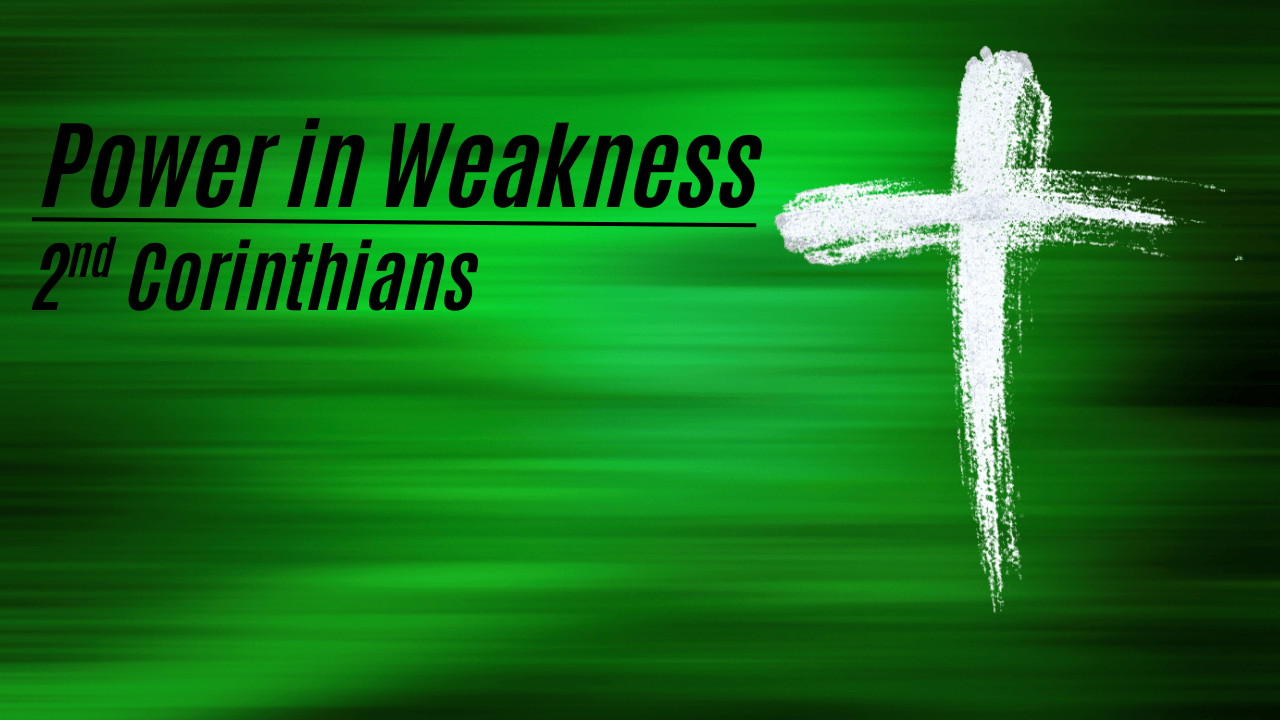
Second Corinthians is Paul’s defense of his love for and love toward the church in Corinth. Paul’s defends his apostolic ministry against critics who question his authority. He recounts profound suffering—beatings, imprisonment, near-death experiences—yet refuses to boast except in his weaknesses. Through personal vulnerability, Paul reveals Christ's power working most effectively in human frailty. He describes his mysterious "thorn in the flesh," where God's response becomes the letter's centerpiece: "My grace is sufficient for you, for my power is made perfect in weakness." Paul embraces this paradox, demonstrating that divine strength flows through broken vessels. His authenticity and struggles validate rather than undermine his ministry, proving that God's power shines brightest through human limitation and dependence.

